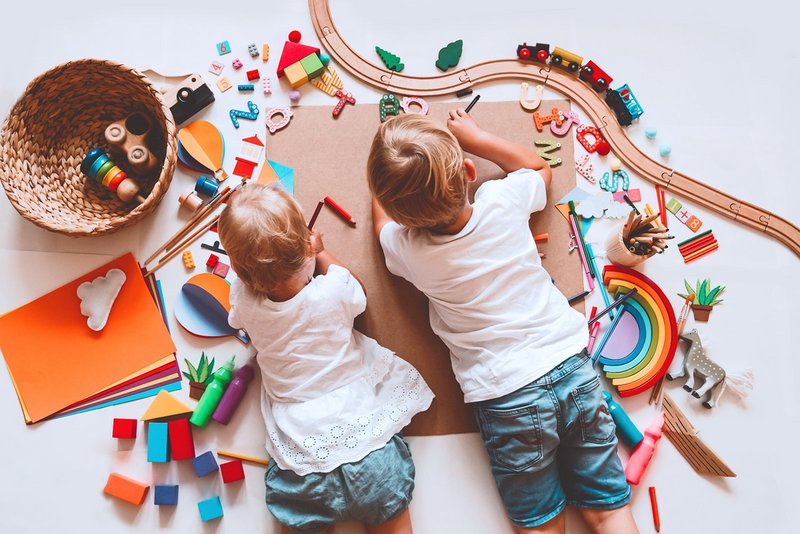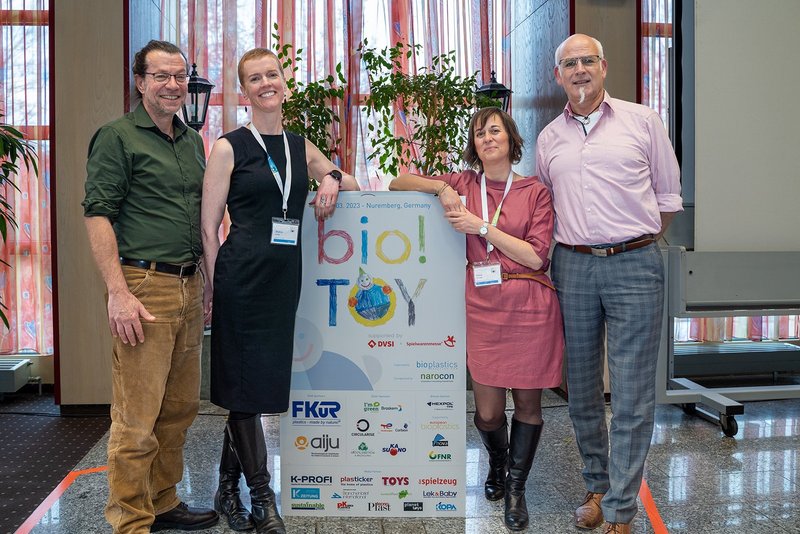
PlayBack - Out of the Toy Box, Into the Circular Economy
By Sibylle Dorndorf
Who wants broken toys for their birthday? The answer is Fisher-Price. To mark its 90th anniversary in 2020, the well-known toy brand called on customers to collect toys that had been played with. In six Rewe Centers, colorful Fisher-Price containers were hoping for merchandise.
Recycling after return

And it wasn't long in coming, according to Anne Polsak, Head of Corporate Communications at Mattel DACH: "We were pleasantly surprised by the willingness of parents and children to return their old and broken toys to us. It certainly contributed to the success of the campaign that we made it easy for consumers to return them." That, along with the company's goal to market only toys and packaging made from 100 percent recycled, recyclable or bio-based plastics by 2030, sparked the PlayBack campaign in 2021. Among other things, it involves allowing consumers in Germany to return broken or discarded Mattel toys to the company free of charge instead of throwing them away. Mattel recovers the materials to reuse as recycled components in new products. PlayBack is very simple: You register on the Mattel homepage, receive a shipping label by mail, print it out, pack the products in a box and drop it off at the nearest post office. Via free DHL Green shipping, aging Barbie dolls, Matchbox cars, action figures and worn-out Fisher-Price toys then end up at recycling companies. For every kilogram of plastic collected, Mattel donates one euro to the children's charity Bild hilft e. V. "Ein Herz für Kinder".
Pave circulation paths

Now, good toys have never been disposable items, but much sought-after goods at flea markets, slumbering treasures in attics and life companions for several generations. Since awareness of sustainable consumption has grown, companies have been encouraged to make suitable offers. Says Anne Polsak, "Involving retailers and running returns through toy stores would be a good solution to make consumers aware." But in the opinion of the majority of retailers, toy take-back is not feasible alongside day-to-day business.
DVSI tests pilot project for toy take-back
Initial attempts by some toy companies to put this into practice failed. What is needed now are overarching industry solutions. The German Association of the Toy Industry is working on such a solution, confirms DVSI Managing Director Ulrich Brobeil. Together with the waste disposal service provider Zentek, DVSI launched a unique nationwide project at the beginning of the year. From January to the end of March 2023, broken toys could be handed in at the recycling center in Neustadt near Coburg in specially set-up mesh boxes. Based on this pilot project, the recycling options for discarded dolls, stuffed animals & Co. are currently being examined. But even that is not easy. Toys are often made of many different materials. Not all of them are recyclable and separable. It is particularly difficult when parts are permanently assembled with each other. It's a seemingly endless cycle that Mattel is trying to break with its PlayBack initiative.
HolyPoly sets plastic recycling cycles in motion

To this end, the company has teamed up with the start-up HolyPoly, whose evocative motto is: "Plastic. Circular. Playfully simple." Behind the HolyPoly concept is practical know-how from plastics recycling. Since the beginning of 2021, the Dresden-based "plastic problem solvers" have been helping brand-name manufacturers set a functioning circular economy in motion. How something like this can look in practice is explained by HolyPoly co-founder Fridolin Pflüger: "We don't limit ourselves to good advice, but take over the complete execution. This is how we ensure that the project goals are actually achieved. It starts with us exploring the respective individual path to the circular economy with the customer and jointly determining which step to take next." Sounds easier than it is. The challenges along the entire value chain are manifold.
Toy collection as a recycling project for schools
Fridolin Pflüger cites the PlayBack recycling program, which started its second round at the end of 2022, as a good example of successful circular economy. Together with the collection system "Sammeldrache", Mattel is now calling on schools to participate in the recycling project... Participating institutions will be sent boxes in which broken toys can be collected from children's rooms. For each box filled with plastic toys, the institutions receive so-called "Green Environment Points", which they can then exchange for premiums such as sports equipment, learning or craft materials, books, IT equipment, technical equipment or toys in the Collecting Dragon Shop. In parallel, Mattel offers a collection of methods for teachers to download from the PlayBack website, so that background information on the circular economy and conscious consumption can also be passed on to children in the classroom. The teaching materials were developed in cooperation with the Dresden-based Kunststoffschmiede, which is committed to environmental education. Such a commitment does not generate sales, but it does create added value for the respective company in terms of credible sustainability communication. "R&D and marketing come together in the best sense," says Fridolin Pflüger. "Data and fact-based results offer authentic stories of business transformation and form the basis for economically functioning material cycles."
Retail can score twice in circular economy
What should not only appeal to Mattel: The HolyPoly concept also involves retailers. Pflüger explains: "We have already worked successfully with retailers in our recycling programs. Retailers have the special characteristic that they serve as a point of contact for consumers who want advice and information about the range of goods on offer. It therefore makes sense to draw attention to return options at these points of sale or to make return offers directly. This applies equally to stationary and online retail. However, simply setting up collection boxes is not enough to anchor return systems in consumer behavior. But more comprehensive measures are needed to educate customers about how to deal with the product at the end of its life. This includes, for example, pointing out the available return options during the purchasing process. For this, manufacturers should provide retailers with the necessary information, ways and means."
Recycling offers must arouse the desire to participate
The success of the "Ich war eine Dose" advertising campaign in the 1980s was a gamechanger. It all started with the shock of the oil price crisis in 1973, which suddenly made Germans realize that natural resources are limited. A rethinking took place. Topics such as "saving energy," "preserving nature," and "conserving raw materials" came into focus. Recycling played a key role. Sections of the population began to voluntarily separate their waste. At the end of the 1970s, the first bottle banks appeared next to the waste paper collection points. Then, in the mid-1980s, the "I was a can" campaign of the Tinplate Information Center (IZW), founded in 1970, caused a sensation and generated conversation. It initiated a rethinking process and set a benchmark in the packaging sector - and not only there.
From on-boarding to off-boarding
PlayBack can do even more. It enables a user experience at the end of the product life cycle that, in contrast to launch and sales, has received little attention to date. To achieve this, retailers and manufacturers alike must take responsibility and become active together in the sense of well-designed product off-boarding. After all, toys are and will remain valuable life companions, albeit in a somewhat modified form in the sense of PlayBack.
Founded in 2020, HolyPoly GmbH helps responsible brands keep plastic in the loop - as a full-service partner for the high-quality use of recycled plastics and the establishment of innovative recycling programs. The startup's mission is to turn recycling from an exception to a matter of course and work with brands to bring sustainable plastic products into mass production: 100 percent recycled and 100 percent recyclable, if possible.
About the author
Sibylle Dorndorf has been writing about the toy industry for almost 30 years. Most recently, the trade journalist was editor-in-chief of the TOYS magazine family at Göller Verlag, Baden-Baden. Her passion: companies that reinvent themselves, brands that position themselves credibly, people who have something to say and products with a future.




